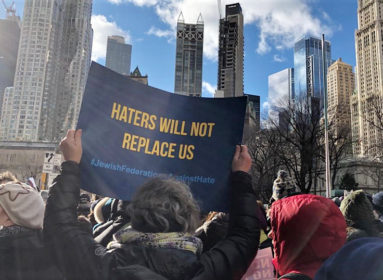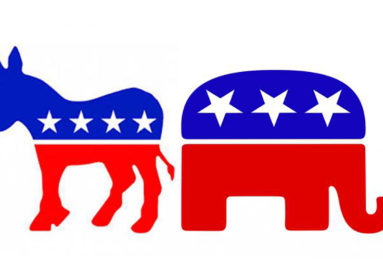Recaps of our Q & A’s from the past year…
REV. DR. DEEDEE M. COLEMAN
Pastor of Russell Street Missionary Baptist Church in Detroit
Jan. 7, 2011
Last October, I went on a mission to Israel with 34 fellow pastors. They had notions about everything – notions about settlements, notions about how Israel was treating the Palestinian people, notions that Israel is so well situated that they’re more of a threat in the area than anyone else. … We went to Sderot and heard testimonies of how people’s lives are being shattered … We went to a little town outside Sderot and visited a school ground that is covered by a bomb shelter. They see the babies playing, not understanding initially that it’s a bomb shelter where you can’t see the sun. The children had to tell the differnce between a bell ringing and a siren screaming. How do you train babies to make that distinction to save their lives? They all left with a desire to be pro-Israel advocates.
GARY KENZER
Executive Director, HonestReporting
Feb. 11, 2011
We want to make sure that Israel is treated no differently than any other country in the world, in other words, innocent until proven guilty. And we want people to understand that Israel isn’t perfect, that “perfection” isn’t a prerequisite for being treated fairly by international media and governments. No country is perfect. A lot of people will point to a news source they don’t agree with and say that they stopped reading it or listening to it. We say that you have to read or listen. The Chinese general Sun-tzu said, “Keep your friends close, and your enemies closer.” You can’t insulate yourself by only reading things you agree with. You have to know your side of the story, and you have to know and be able to explain in detail the other side of the story. That’s effective Israel advocacy.
LEE SMITH
Author of “The Strong Horse: Power Politics, and the Clash of Arab Civilizations”
Feb. 25, 2011
Don’t believe it when people talk about the moderate nature of the [Muslim] Brotherhood – this is a misreading of what the Brotherhood wants and what the Brotherhood thinks. President Obama and others have said that it’s very unlikely that the Muslim Brotherhood would win in a large round of elections because the Egyptians want moderate, secular representatives in their government; unfortunately, we just don’t know this. … What is not well understood by outsiders is that the Muslim Brotherhood is an integral part of Egyptian modernity. Its influence historically is tremendous. It is inseparable from political modernity in Egypt. The notion that this local movement will not gain power in Egypt seems to me to be ridiculous. The only way that would happen is if they’re repressed by the regime, which may very well happen.
DAVID JACOBS
Executive Director, Mandell Jewish Community Center, West Hartford
March 25, 2011
The Jewish part of the Center falls into the framework of the Jewish Outreach Institute’s new concept of “Big Tent Judaism.” “Big Tent” is about removing barriers; making it easy for people to participate; being extremely welcoming. It’s all based upon the Biblical tent of Abraham and Sarah. So we basically say “you are welcome here in this Jewish place.” You know, very often someone will ask: “Do you have to be Jewish to join?” Well, no, we’re a Jewish place for all people…not a place just for Jewish people. And so, the JCC plays a very big role in welcoming everyone, but it’s always within a Jewish context.
PIERRE SAUVAGE
Emmy-award winning filmmaker and producer of a film about Holocaust rescuer and Ridgefield resident, Varian Fry
April 15, 2011
We have a lot of clichéd notions about rescuers and we imagine them to be tortured souls who agonize over the decision they must make. Nothing could be further from the truth – they acted because they felt they had no choice, and because it seemed so natural to them._That’s a very hopeful aspect of human nature. I’ve come to conclude that, at bottom, people who are most comfortable being who they are, are most likely to help others.
DR. ANN HEEKIN
Consultant to the Center for Christian-Jewish Understanding of Sacred Heart University
April 22, 2011
I tell my students the starfish midrash: A boy was picking up starfish stranded by the retreating tide and throwing them back into the sea to save them. A man approached the boy and said, “This beach goes on for miles, and there are thousands of starfish. You’ll never get them all back in. Your efforts don’t make a difference!” The boy looked at the starfish in his hand and threw it into the water. He said, “It makes a difference to this one.”
ARLEN SHUMER
Artist and author, creator of the Jewish superhero Captain Israel
May 6, 2011
In 2002, I was watching the second Intifada unfold and thinking, how can I help Israel? I was never an organizational Jew, so I didn’t know how to plug into existing efforts. I thought about Captain America and how he was created by two Jewish artists, Joe Simon and Jack Kirby, and how he was used to galvanize Americans behind the war effort. In 1940 and 1941, Captain America stumped for U.S. War Bonds._I thought, if two Jews could create Captain America, one can create Captain Israel.
MARC WORTMAN
Author of “The Millionaires’ Unit: The Aristocratic Flyboys Who Fought the Great War and Invented American Air Power” and “The Bonfire: The Siege and Burning of Atlanta” and a resident of New Haven
July 1, 2011
In the famous ceremonial letter that Pres. Washington wrote to the Hebrew Congregation of Newport, Rhode Island in 1790, he said, “The government of the United States …gives to bigotry no sanction, to persecution no assistance.” The Revolution established the ideals of the nation and the Civil War put those ideals to the fire and for the Jews, this was the first time in which their presence and active part of the U.S. were made real and perpetual. While Jews ultimately played an extremely small role reflecting an extremely small percentage of the population, as for every American, the Civil War influences what it means for all of us to be citizens today and forever.
JEFF JACOBY
Op-ed columnist for The Boston Globe
June 10, 2011
There are some myths that go to the very roots of the [Israeli-Palestinian] conflict itself. The myth that Jewish occupation caused the conflict is extremely easy to debunk. In 1967, when Jordan, Egypt, and Syria set out to eradicate Israel, there was no occupation of the Golan or Gaza or Judea and Samaria. And yet the conflict blazed. The PLO was founded in 1964, three years before the Six Day War. Clearly it wasn’t created to liberate the “occupied territories” – there weren’t any in 1964! The conflict is about the existence of a Jewish state, not about Gaza or the West Bank.
DR. ROBERT A. BURT
Professor of Law at Yale Law School
July 8, 2011
Tom Segev’s excellent book, “The Seventh Million,” is a study of the attitudes in Israel toward the Holocaust. The basic Zionist view was that the Jews who remained in Europe were led like sheep to the slaughter, and that a true Zionist would stand up for himself and leave behind the Eastern European shtetl to build a new society in Israel. The shtetl society was where you were ashamed of yourself and your Jewishness; the Yishuv that preceded the modern State of Israel represented the strong, new, self-sufficient Jew who worked the land, created an army, defended himself.
SEN. JOSEPH I. LIEBERMAN
U.S. Senator from Connecticut and author of “The Gift of Rest: Discovering the Beauty of the Sabbath”
Sept. 2, 1011
I was raised in a Sabbath observant family. When I went to college, I did something that was probably according to script – I stopped observing. Then, in my last year of law school my grandmother died. She lived with us and was a very important person in my life and I think part of what happened was that I felt my grandmother – whom I called Baba – was my link to the history of Judaism – she was a link in the chain of historic Judaism and, now that she was gone, I really had a choice to make as to whether I wanted to be a strong link in the chain. I did. And so I started to come back to Sabbath observance. By the time I got into public life, elected to my first office as a state senator in 1970, I was observing Shabbat and trying to combine my public life with my observance.
JANE LEAVY
Author of “Sandy Koufax: A Lefty’s Legacy” and “The Last Boy: Mickey Mantle and The End of America’s Childhood”
Oct. 7, 2011
My grandmother lived two blocks from the stadium or, as I often say, a loud foul ball from home plate. And going to see my grandmother was like going to see the Yankees. The shul that my grandmother belonged to wasn’t big enough to accommodate the Rosh Hashanah and Yom Kippur crowds, so those services were always held up the street in the ballroom of the Concourse Plaza Hotel. It had big tall windows and beautiful heavy brocade drapes. My grandmother would sneak me past the front door with my baseball glove and a transistor radio, and I would drape myself in the drapes with my baseball glove, and if the radio got too loud, she would just pray louder.
MARTIN FLETCHER
Former NBC Tel Aviv Bureau Chief, author of “Walking Israel,” which won a Jewish National Book Award, and the novel “The List”
Oct. 28, 2011
I no longer believe that there can be a peace agreement. I was a real left winger, but my last book, “Walking Israel,” changed my mind. Until then I believed that if there were close relations and economic development and, ultimately, mutual interest in stability, that would lead to peace. Now, after the research I did for “Walking Israel” — even though I lived there for 25/30 years before I did this research — I eventually understood that actually no Arabs want Israel to exist. Every Arab I spoke with said the same thing: one day something will happen and Israel won’t be here. Even those who were my Arab friends, whom I know are great citizens and would never do anything to harm the country, they all say “Well, one day Israel will go.” I didn’t know they felt that way. It surprised me.
JUNE FEISS HERSH
Author of “Recipes Remembered: A Celebration of Survival”
Nov. 4, 2011
This book isn’t trivializing the Holocaust, but rather it’s saying that we don’t have to focus only on the tragedy, but we should also celebrate the lives of those who are here. For Jews, it’s considered a shanda to mourn the living – we must celebrate the living. One critic asked why I started with the survivors’ childhoods. I did so because this was their roots and foundation, and their childhoods ended when the war began. We’ll never forget the bad stuff, but we also need to preserve the good stuff. Traumatic experiences tend to stay with us longer, overshadowing happy memories. I wanted the happy not to fade but to stay central. I truly feel that while we don’t always get to choose what comes our way, we do get to choose how we handle what we’re given.








 Southern New England Jewish Ledger
Southern New England Jewish Ledger














